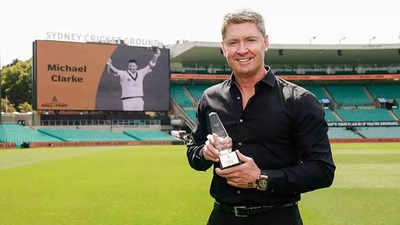timesofiNEW DELHI: The Australian Cricket Hall of Fame inducted World Cup-winning former captain Michael Clarke as its 64th member, the nation’s cricket governing body said Thursday. On Wednesday, the induction ceremony was held at the Sydney Cricket Ground.
“Over 8600 Test runs, 28 hundreds and the only cricketer to hit a Test triple-century on the SCG.
“Congratulations to former Australian captain Michael Clarke AO on his induction to the Australian Cricket Hall of Fame,” wrote Cricket Australia on X.
Over the course of his 12-year career, Clarke amassed 8643 and 7981 runs in Tests and ODIs, respectively, at averages of 49.10 and 44.58.
At the Sydney Cricket Ground, he scored 28 hundreds, including a remarkable 329 against India, while saving his best for the longest format.
He participated in up to 35 Test matches against England and 22 against India, averaging over 56 with seven hundreds each against the two best sides.
Both the ODI World Cup victory at home in 2015 and the 5-0 series victory in the 2013-2014 Ashes were led by the 43-year-old captain of Australia.
“To be able to sit along so many wonderful players, idols, role models growing up as a kid and looking up to is something I’m honoured by,” Clarke said at the SCG during the induction ceremony.
In addition, Clarke received a lot of praise for the way he led the squad following the death of teenage opener Phil Hughes in a domestic match in 2014, which shocked Australian cricket.
The two were best friends and played for New South Wales in the home circuit.
When Hughes was hit on the neck by a bouncer during a Sheffield Shield game in Sydney, Clarke was the Australian captain. One of Hughes’ pall-bearers at the funeral was a broken Clarke, who grieved as he gave a moving eulogy for the athlete who had passed away.
A few days later, he dedicated his 28th Test century to his “little brother” in the opening Test of a series against India in Adelaide. Following the Ashes series against England in 2015, Clarke announced his retirement from cricket.
“Retirement does a lot of things to you. Through stages of watching cricket now, you miss parts. When you play at the highest level, people talk about your international career but for me, it started at six years of age. I retired at 34 so it was my life. It’s still a part of my life.
“Cricket – it’s probably so similar to life in general. You walk out and make 100 and then lift the bat, and then you walk out to field, field in slip and drop a catch second ball of the game,” he reflected at the SCG on Wednesday.




